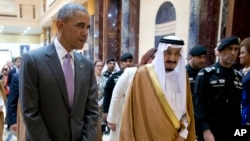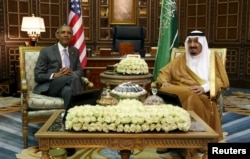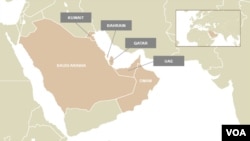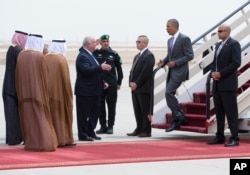President Barack Obama and Saudi Arabia’s King Salman agreed on the importance of "an inclusive approach to de-escalating regional conflicts" during a two-hour closed meeting Wednesday in Riyadh.
In a statement after the meeting at Erga Palace, the White House said the two leaders discussed the "challenges posed by Iran’s provocative activities in the [Mideast] region."
Tension between the U.S. and Saudi Arabia has risen over differing approaches to Iran and the fight against terrorism.
The statement said Obama welcomed the recent cessation of hostilities in Yemen "and the king’s commitment to providing humanitarian assistance across all of Yemen."
In addition, "the president underscored the importance of accelerating the campaign against [Islamic State] and welcomed Saudi Arabia’s important role in the coalition" of nations that is fighting the militant group.
Later, Obama met with the crown prince of Abu Dhabi, Sheikh Mohammed bin Zayed Al Nahyan, deputy supreme commander of the UAE armed forces.
The meetings came a day before a Gulf Cooperation Council summit. The United States and its Arab partners will address pressing issues facing the region at the summit, which will be attended by officials from the GCC alliance of six Gulf states: Saudi Arabia, Kuwait, the United Arab Emirates, Qatar, Bahrain and Oman.
The White House on Wednesday called the summit "an important opportunity for the United States and its Gulf partners to strengthen cooperation against [the Islamic State group] and also to address regional conflicts."
Top threats
The United States and much of Europe see Islamic State and al-Qaida as the top threats in the region and around the world. For many of the Gulf states, though, the main threat is Iran and the people and groups Tehran supports, such as Syrian President Bashar al-Assad and Shi’ite Houthi rebels in Yemen.
The Sunni-majority Saudis have led a costly military intervention against the Houthis.
The White House said Obama and GCC leaders would look at ways to step up cooperation and “align” their policies and approaches in areas of mutual interest, such as countering terrorism and promoting peace and stability in places like Yemen and Syria.
Rob Malley, White House coordinator for the Middle East and North Africa, said sectarian fights, like the one in Yemen, shift the focus away from the coalition’s battle against Islamic State and al-Qaida. So, he said, the White House is seeking to de-escalate those conflicts.
Saudi Arabia, which faces shrinking revenues with the downturn in oil prices, is working to build up its missile systems as regional rival Iran continues to bolster its military capabilities.
“Iran does not stop improving its air, missiles and naval capabilities to threaten traffic through the Gulf,” said Anthony Cordesman, who holds the Arleigh Burke Chair in Strategy at the Center for Strategic and International Studies.
Despite philosophical differences, the relationship between the United States and Saudi Arabia is solid, according to Fahad Nazer, a senior political analyst with JTG, Inc. and former adviser at the Saudi embassy in Washington.
“The two countries continue to support each other in the military campaigns that each of them is leading,” Nazer said. “Not only has Saudi Arabia been participating in the ongoing U.S.-led airstrikes against the strongholds of the terrorist group known as the Islamic State in Syria, but it has done so in a very public fashion.”
Intelligence, logistical support
He pointed to U.S. intelligence and logistical support to the Saudi-led campaign against Houthi rebels.
“I think that many of the myriad mutual interests that have sustained this relationship since the 1940's will sustain it for the future,” Nazer predicted.
White House officials agreed the two sides would continue to work as partners to combat terrorism, help secure the region and counter Iran’s destabilizing actions.
"I don't think that there can be any confusion or ambiguity about who is our partner in the region and who isn’t," Malley said.
After the summit, officials are expected to announce new defense assistance for the GCC and increased cooperation.
Defense capabilities
White House officials say the assistance will include a simplified process for transferring defense capabilities to Gulf nations, plans to boost the GCC’s ballistic defense missile defense system and increased defense against cyber threats.
Expectations for significant outcomes from this summit are low, especially during a presidential election year.
“The Saudis obviously are looking at a situation where you have presidential candidates that as yet have not really provided any clear indication as to what the United States will be as an ally in the future.” Cordesman said.
Carla Babb in Riyadh and Cecily Hilleary in Washington contributed to this report.







